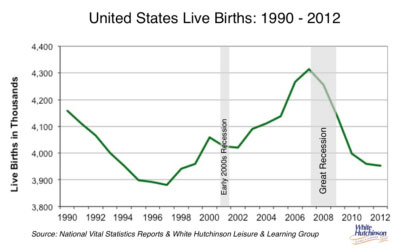
Vol. XIV, No. 1, January 2014
- Editor's corner
- Queue line design: theory versus perception
- Silverlake, the Family Place
- Four years after the economic recovery, America's birth rate remains depressed
- Foundations Entertainment University coming to Phoenix
- The Silver Screen is losing its shine
- Surfing in the desert
- Da Nang, Vietnam project gets a name
- It is very simply a people concept
- How to be friendly to food allergy sufferers
- The scoop on Chuck E. Cheese's going private
Four years after the economic recovery, America's birth rate remains depressed
What has been described as a baby bust that began with the Great Recession is showing signs of slowing, but U.S. women aren't having more children. The final birth data for 2012 U.S. births was just released. 3,952,841 births were registered in 2012, down only 749 births from 2011. However, the nation's total fertility rate dropped 1% in 2012 (The reason birth's didn't drop by the same percentage is because as the fertility rate is dropping, the population of child-bearing age women is increasing each year.)

Data for 2013 doesn't look any more promising. The CDC recently released early findings for 2013 showing the U.S. fertility rate dropped to 62.7 births per 1,000 women during the 12 months ending June 2013, down from 63.0 for the comparable twelve months ending June 2011.
During the Great Recession many families put off having children due to economic constraints. Demographers have been expecting U.S. women to start having more babies as the economy picks up, but that hasn't happened.
Mark Mather of the Population Reference Bureau said, “The fact that fertility has continued to drop, post-recession, suggests that this decline is linked to longer-term, non-economic factors. A growing number of young adults are going to college and postponing marriage and family formation.” In fact, the mean age of mothers at first birth rose in 2012 to 25.8 years, up from 25.6 years in 2011 and from 21.4 years in 1970.
Basically what this means is that what used to be the expectation that the number of children will always be on the increase is no longer true. In fact, as particular neighborhoods age, their birth rate and the number of younger children will decrease even faster than the overall U.S. rate. So when doing feasibility studies for a new center that is highly dependent on younger children for its success, the fertility rate of its population needs to be carefully evaluated, as the number of younger children could very well decline in the near future.
Vol. XIV, No. 1, January 2014
- Editor's corner
- Queue line design: theory versus perception
- Silverlake, the Family Place
- Four years after the economic recovery, America's birth rate remains depressed
- Foundations Entertainment University coming to Phoenix
- The Silver Screen is losing its shine
- Surfing in the desert
- Da Nang, Vietnam project gets a name
- It is very simply a people concept
- How to be friendly to food allergy sufferers
- The scoop on Chuck E. Cheese's going private


